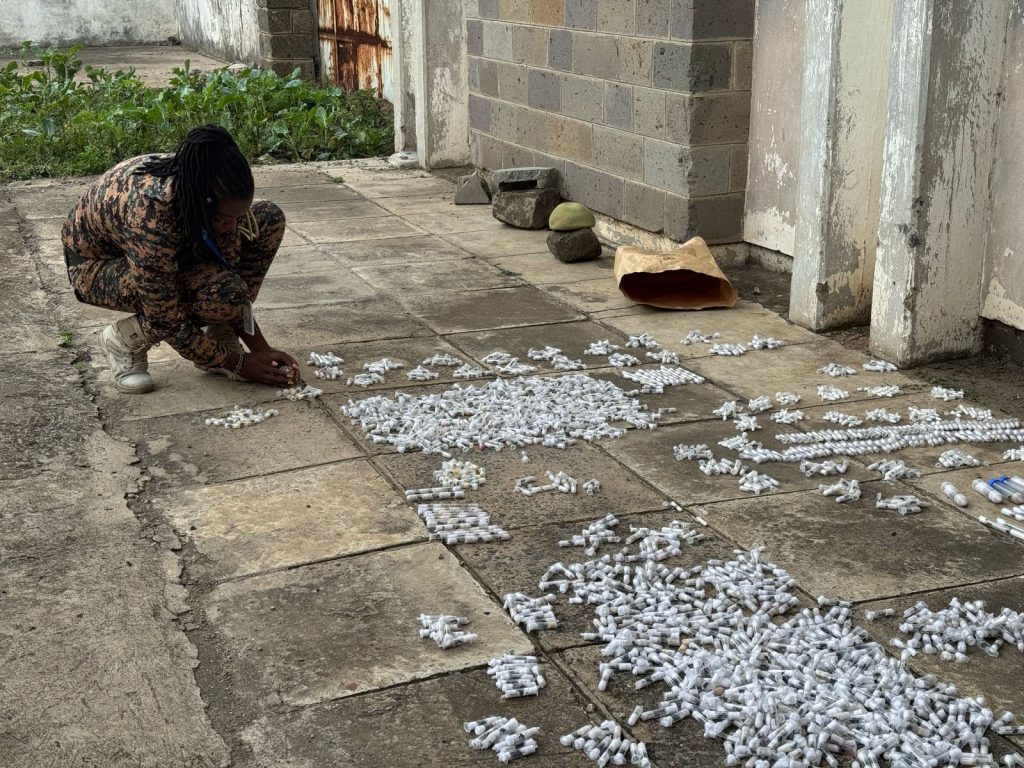The Kenya Wildlife Service aims to enhance surveillance at airports and exit points, including the use of advanced scanning technologies to detect concealed wildlife.
The authority also wants public awareness campaigns targeting courier services, logistics providers, and travelers to identify and report suspicious activities.
Further, KWS is seeking research partnerships to understand global demand and the ecological implications of illegal species removal.
This is after four suspects were caught attempting to smuggle and commit biopiracy of live ants. The ants include the ecologically significant Messor cephalotes species, which is native to Kenya.
The prosecution, led by Allen Mulama and Paula Rono, told the court that the Belgians, Lornoy David and Seppe Lodewijckx, were arrested on April 5, 2025, at around 10:00 a.m. at Jane Guest House in the Lake View area of Naivasha, Nakuru County.
They were charged with illegal possession and trafficking of live wildlife before Senior Principal Magistrate Njeri Thuku at the JKIA Law Courts in Nairobi.
The two were found in possession of approximately 5,000 live queen ants stored in 2,244 tubes, with an estimated street value of Sh1 million.
They were charged with dealing in wildlife species without a permit, contrary to Section 95(c) of the Wildlife Conservation and Management Act, Cap 376, Laws of Kenya.
In a separate but related case, Vietnamese national Duh Hung Nguyen and Kenyan national Dennis Ng’ang’a were charged with illegal possession and trade of around 400 live queen ants, valued at Sh200,000.
They all pleaded guilty to the charges. The offense is reported to have occurred between April 5, 2025 and April 6, 2025 at Hemak Towers Suite in Nairobi’s Central Business District and Tofina Muthama Apartments in Syokimau, Nairobi County.
In reaction, KWS also called for community sensitization initiatives to safeguard local biodiversity from exploitation and stronger border and conservation area monitoring to disrupt wildlife and genetic resource trafficking networks.
“KWS urges all stakeholders—including communities, government agencies, researchers, and the global conservation community—to remain vigilant and work collaboratively to protect Kenya’s rich biodiversity heritage, especially biopiracy, which denies the country the much-needed foreign exchange,” the KWS said.
The arrests were made after authorities intercepted live queen ants concealed in specially modified test tubes and syringes.
Kenya Wildlife Service said the case not only marks a serious wildlife crime but also constitutes biopiracy, as it involves the unlawful access and attempted export of Kenya’s genetic resources without prior informed consent or benefit-sharing, in direct violation of national law and the Nagoya Protocol on Access and Benefit-Sharing.
Investigations revealed that the test tubes had been designed to sustain the ants for up to two months and evade airport security detection, including X-ray scanners.
Cotton wool was used to maintain the ants’ survival during transit, indicating a premeditated and well-executed trafficking operation.
The foreigners entered Kenya on tourist visas with the intention to smuggle the ants to high-value exotic pet markets in Europe and Asia, where demand for rare insect species is rising.
The intercepted ants, particularly the highly sought-after Messor cephalotes, are prized by collectors for their unique behaviour, complex colony-building capabilities and greenhouse pest control.
These traits make them popular in formicariums—artificial ant habitats—driving their illicit trade and illegal removal from the wild.
This case highlights a growing global threat of the biopiracy of native species. Biopiracy refers to the commercial exploitation or export of biological materials, such as plants, animals, and microorganisms, without fair compensation or benefit-sharing with the country of origin. In this instance, the unauthorized collection and export of Messor cephalotes not only undermines Kenya’s sovereign rights over its biodiversity but also deprives local communities and research institutions of potential ecological and economic benefits, including biopiracy.
In Kenya, the ants are protected by international biodiversity treaties and their trade is highly regulated.
“This prosecution sends a strong message that Kenya will enforce compliance… and marks a significant step forward in Kenya’s fight against unconventional wildlife crimes,” the KWS said.
Email your news TIPS to Editor@Kahawatungu.com — this is our only official communication channel


